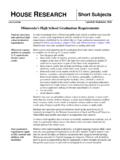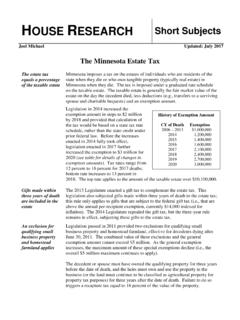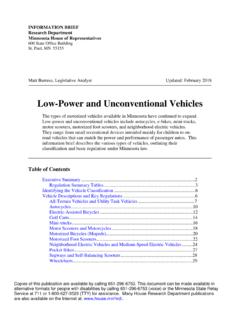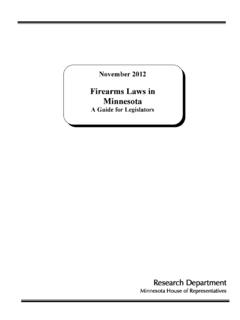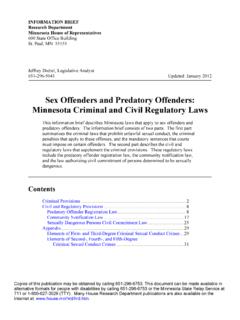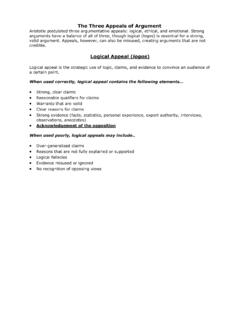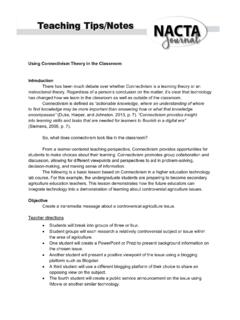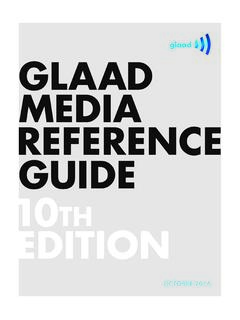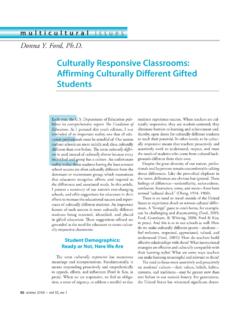Transcription of Racial Profiling Studies in Law Enforcement: Issues and ...
1 INFORMATION BRIEFM innesota House of RepresentativesResearch Department600 State Office BuildingSt. Paul, MN 55155 June 2000 Jim Cleary,* Legislative Analyst651-296-5053 Racial Profiling Studies in Law Enforcement: Issues and MethodologyMany communities have undertaken Racial Profiling Studies to examine if and howsomeone s race and ethnicity plays a part in stops by law enforcement. Thisinformation brief describes the central concepts, Issues , and methodologicalchallenges involved in studying Racial Profiling in law I: Issues Relating to Racial Profiling Definitions of Racial Profiling .
2 5 Varying Viewpoints on Racial of the Rational Discrimination Basis for Racial Profiling : Circular of Police Discretion: An Important Windows vs. Community Policing: The Context of Racial Profiling Data Collection Practices Among the Behavioral Responses to Racial Profiling *For legal questions about Racial Profiling , please contact legislative analyst Judith Zollar, publication can be made available in alternative formats upon request. Please call 651-296-6753 (voice);or the Minnesota State Relay Service at 1-800-627-3529 (TTY) for assistance. Many House ResearchDepartment publications are also available on the Internet at: Research Department June 2000 Racial Profiling Studies in Law Enforcement: Issues and Methodology Page 2 Part II: Research Methodology for Studying Racial of Challenges in Any Racial Profiling Racial Profiling .
3 23 Involving an Academic/Research Which Police Stops to by Officers and Data Uses of the Data: Effects on Police Morale, Arrests, and Crime the Baseline Standard for for the to Record the Stop What Information to the Driver s : Looking Beyond the Research DepartmentJune 2000 Racial Profiling Studies in Law Enforcement: Issues and MethodologyPage 31 Police to Gather Race Data: St. Paul, Minneapolis Addressing Question of Bias in Traffic Stops. St. PaulPioneer Press 14 April 2000: Justices s Disparities in Race Draw Scrutiny: Minorities Locked up in Disproportionate Numbers.
4 Minneapolis Star Tribune 9 April 2000: For an example of the expression of these conflicting viewpoints at the start of a Racial Profiling study, see:Barovick, Harriet. DWB: Driving While Black: Incidents in New Jersey and Maryland Heat up the Issue ofRacial Profiling by State Highway Patrols. Time 15 June 1998: concern about Racial Profiling is erupting throughout the nation. Many cities and states havedecided to study Racial Profiling , or how race and ethnicity may play a part in stops by lawenforcement in their jurisdictions. Minnesota is no different. Efforts are underway to begin racialprofiling Studies of traffic stops in Minnesota, including separate Studies by the Minnesota StatePatrol, the Minneapolis Police Department, and the St.
5 Paul Police A larger study isalso being planned by the Minneapolis-based Council on Crime and Justice to evaluate the role ofrace in the broader justice system in Minnesota. That study reportedly will have a three-year, $3million budget, and will be funded with grants from the Minnesota Department of Public Safetyand other sources, including private , the announcement of a Racial Profiling study by police and/or other public officialstypically includes a denial that Racial Profiling exists within this jurisdiction, but also anacknowledgment that it would be helpful to study the pattern of police stops within thejurisdiction.
6 The very act of undertaking such a study reaffirms the general public policy goal thatpolicing decisions should be race-neutral. However, it also signals to law enforcement officersthat extra caution may be needed to ensure that the data they collect while performing their dutiesshould reflect a lack of bias in their own performance. Officers and their unions may publiclyaccept the political need for such a study, provided that such data will not be used to monitor ordiscipline individual officers. Simultaneously, they may feel that their integrity is beingquestioned, that their exercise of judgment is being limited, and that their ability to fight crime isbeing eroded.
7 Finally, the announcement of such a study provides hope to many communities ofcolor that help may finally be at hand, that something is being done about the problem that theyhave long claimed to exist and which, they may feel, the data will surely seems unlikely, given this rather disparate set of perceptions and desires, that any racialprofiling study will ever be able to satisfy all interested constituencies. The experience of otherresearchers in this area suggests that, more than likely, the results of the study will be at leastsomewhat ambiguous, with much of the resulting debate perhaps centering on data integrity andthe selection of appropriate baseline measures for purpose of this information brief is to describe some of the central concepts, Issues , andmethodological challenges involved in law enforcement Racial Profiling Studies generally,borrowing heavily from the rapidly developing literature on this topic.
8 It is intended that thisoverview be useful to legislators and other public officials who may be considering whether toHouse Research DepartmentJune 2000 Racial Profiling Studies in Law Enforcement: Issues and MethodologyPage 4fund or undertake such a study, or who may need to understand and critically evaluate thefindings of such Studies . The information brief may also be useful to police administratorscontemplating or conducting a Racial Profiling study, as well as to community advocates involvedin monitoring or using the study s is important to note that this information brief does not contain a legal analysis or constitutionalreview of the underlying Issues involving search and seizure, equal protection, and so on.
9 Such ananalysis and review will be forthcoming from other House Research Department Research DepartmentJune 2000 Racial Profiling Studies in Law Enforcement: Issues and MethodologyPage 54 Barovick, op. See for example: Douglas, John, and Mark Olshaker. Mind Hunters: Inside the FBI s Elite Serial CrimesUnit. New York: Simon and Shuster, Inc., 1995. 6 Cole, David, and John Marcello. Symposium: opposing Views of Racial Profiling . Insight on the News19 July 1999: 26. Cole is a professor at Georgetown University in Washington, , and the author of No EqualJustice. Marcello is a former DEA agent who in the early 1970s developed the DEA s drug-courier See, for example: Kennedy, Randall.
10 Suspect Policy. The New Republic 13 Sept. 1999: I: Issues Relating to Racial Profiling StudiesCompeting Definitions of " Racial Profiling "The term Profiling refers to the police practice of viewing certain characteristics as indicatorsof criminal Profiling is reportedly an established law enforcement practice throughoutthe nation, having evolved during the past few decades with the incorporation of social sciencetheory and statistical methodology into law enforcement s crime solving and crime preventionstrategies. Although not a panacea, Profiling has been shown to be a successful supplement toolder and more fundamental policing term Racial Profiling , on the other hand, is a relatively new term and, thus, there is not yeta clear consensus on its meaning.

